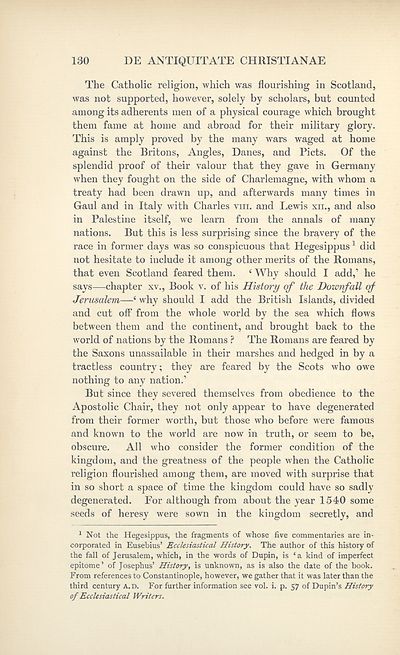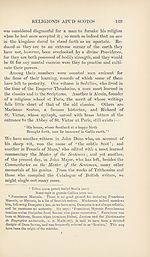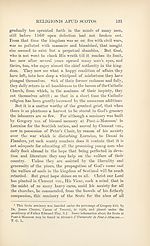Series 1 > Miscellany of the Scottish History Society (Second volume)
(155) Page 130
Download files
Complete book:
Individual page:
Thumbnail gallery: Grid view | List view

130
DE ANTIQUITATE CHRISTIANAE
The Catholic religion, which was flourishing in Scotland,
was not supported, however, solely by scholars, but counted
among its adherents men of a physical courage which brought
them fame at home and abroad for their military glory.
This is amply proved by the many wars waged at home
against the Britons, Angles, Danes, and Piets. Of the
splendid proof of their valour that they gave in Germany
when they fought on the side of Charlemagne, with whom a
treaty had been drawn up, and afterwards many times in
Gaul and in Italy with Charles vm. and Lewis xn., and also
in Palestine itself, we learn from the annals of many
nations. But this is less surprising since the bravery of the
race in former days was so conspicuous that Hegesippus1 did
not hesitate to include it among other merits of the Romans,
that even Scotland feared them. ‘ Why should I add,’ he
says—chapter xv., Book v. of his History of the Downfall of
Jerusalem—‘ why should I add the British Islands, divided
and cut off" from the whole world by the sea which flows
between them and the continent, and brought back to the
world of nations by the Romans ? The Romans are feared by
the Saxons unassailable in their marshes and hedged in by a
tractless country; they are feared by the Scots who owe
nothing to any nation.’
But since they severed themselves from obedience to the
Apostolic Chair, they not only appear to have degenerated
from their former worth, but those who before were famous
and known to the world are now in truth, or seem to be,
obscure. All who consider the former condition of the
kingdom, and the greatness of the people when the Catholic
religion flourished among them, are moved with surprise that
in so short a space of time the kingdom could have so sadly
degenerated. For although from about the year 1540 some
seeds of heresy were sown in the kingdom secretly, and
1 Not the Hegesippus, the fragments of whose five commentaries are in¬
corporated in Eusebius’ Ecclesiastical History. The author of this history of
the fall of Jerusalem, which, in the words of Dupin, is ‘a kind of imperfect
epitome’ of Josephus’ History, is unknown, as is also the date of the book.
From references to Constantinople, however, we gather that it was later than the
third century a.d. For further information see vol. i. p. 57 of Dupin’s History
of Ecclesiastical Writers.
DE ANTIQUITATE CHRISTIANAE
The Catholic religion, which was flourishing in Scotland,
was not supported, however, solely by scholars, but counted
among its adherents men of a physical courage which brought
them fame at home and abroad for their military glory.
This is amply proved by the many wars waged at home
against the Britons, Angles, Danes, and Piets. Of the
splendid proof of their valour that they gave in Germany
when they fought on the side of Charlemagne, with whom a
treaty had been drawn up, and afterwards many times in
Gaul and in Italy with Charles vm. and Lewis xn., and also
in Palestine itself, we learn from the annals of many
nations. But this is less surprising since the bravery of the
race in former days was so conspicuous that Hegesippus1 did
not hesitate to include it among other merits of the Romans,
that even Scotland feared them. ‘ Why should I add,’ he
says—chapter xv., Book v. of his History of the Downfall of
Jerusalem—‘ why should I add the British Islands, divided
and cut off" from the whole world by the sea which flows
between them and the continent, and brought back to the
world of nations by the Romans ? The Romans are feared by
the Saxons unassailable in their marshes and hedged in by a
tractless country; they are feared by the Scots who owe
nothing to any nation.’
But since they severed themselves from obedience to the
Apostolic Chair, they not only appear to have degenerated
from their former worth, but those who before were famous
and known to the world are now in truth, or seem to be,
obscure. All who consider the former condition of the
kingdom, and the greatness of the people when the Catholic
religion flourished among them, are moved with surprise that
in so short a space of time the kingdom could have so sadly
degenerated. For although from about the year 1540 some
seeds of heresy were sown in the kingdom secretly, and
1 Not the Hegesippus, the fragments of whose five commentaries are in¬
corporated in Eusebius’ Ecclesiastical History. The author of this history of
the fall of Jerusalem, which, in the words of Dupin, is ‘a kind of imperfect
epitome’ of Josephus’ History, is unknown, as is also the date of the book.
From references to Constantinople, however, we gather that it was later than the
third century a.d. For further information see vol. i. p. 57 of Dupin’s History
of Ecclesiastical Writers.
Set display mode to:
![]() Universal Viewer |
Universal Viewer | ![]() Mirador |
Large image | Transcription
Mirador |
Large image | Transcription
Images and transcriptions on this page, including medium image downloads, may be used under the Creative Commons Attribution 4.0 International Licence unless otherwise stated. ![]()
| Scottish History Society volumes > Series 1 > Miscellany of the Scottish History Society (Second volume) > (155) Page 130 |
|---|
| Permanent URL | https://digital.nls.uk/126948848 |
|---|
| Attribution and copyright: |
|
|---|
| Description | Over 180 volumes, published by the Scottish History Society, containing original sources on Scotland's history and people. With a wide range of subjects, the books collectively cover all periods from the 12th to 20th centuries, and reflect changing trends in Scottish history. Sources are accompanied by scholarly interpretation, references and bibliographies. Volumes are usually published annually, and more digitised volumes will be added as they become available. |
|---|


